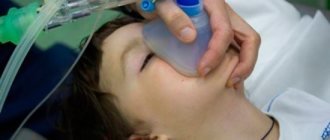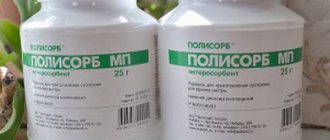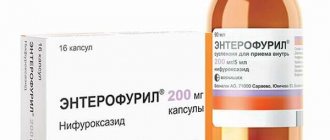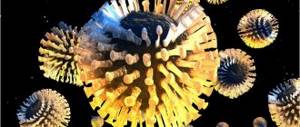Diet in the treatment of gastroenteritis in children is the basis for the fight against the disease. With gastroenteritis, the mucous membrane of the stomach and small intestine becomes inflamed. The disease is detected by the unexpected occurrence of diarrhea (diarrhea), attacks of nausea and vomiting, and possible fever. The diet should be selected individually, taking into account what a sick baby can eat.
Gastroenteritis is caused by bacteria, viruses (rotavirus, adenovirus), parasites, antibiotics, and infections acquired from food. The goal of a diet for gastroenteritis is to minimize the influence of harmful factors on the body by excluding undesirable foods from the diet. Nutrition must be correct.
If there is a suspicion of gastroenteritis in a child, you should initially not let him eat for several hours.
This is necessary to normalize the functioning of the digestive system. The baby should be given plenty of water to prevent the body from losing moisture.
You cannot treat a child yourself. If he shows any symptoms of illness, consult your doctor immediately.
Features of dietary nutrition in case of illness
Patients with gastroenteritis are conventionally divided into three groups:
- infants;
- children from one year old;
- adults.
Division is used to take into account the characteristics of intestinal functioning at different ages.
For babies
Infants have reduced immunity and weaker body defense mechanisms against inflammation compared to adults.
Dehydration should not be allowed. If sick, provide the child with a sufficient amount of fluid during the day. Diluting food is prohibited - the risk of malnutrition is high. They try to reduce the amount of salt in the diet, which contributes to dehydration.
Important! Continue to breastfeed your newborn: with mother's milk, the baby receives the necessary proteins, which are responsible for the functioning of the immune system, and fatty acids. Continue feeding even if feeding with artificial formulas.
For children from one year old
Feeding the baby
The diet strategy is not very strict - they use ready-made baby purees. You should increase your water intake to avoid dehydration. Otherwise, they maintain their usual diet with the exception of fatty, sweet and spicy foods, which can provoke a new round of inflammation.
For adults
Adults can eat a more varied diet with gastroenteritis compared to children. But adults tolerate milk consumption worse. The diet for adults excludes eating fried, spicy, sweet, fatty foods, smoking and drinking alcohol.
The essence of the diet
Gastroenteritis is an infectious disease that most often occurs due to poor hand hygiene and consumption of unwashed vegetables and fruits.
Following a gentle diet during the diet is especially important, because it helps in the treatment of:
- Prevents dehydration due to severe diarrhea and vomiting.
- Provides complete nutrition.
- Maintains electrolyte balance.
- Reduces symptoms.
When diagnosed with gastroenteritis, both diet and drug treatment are agreed upon with a specialist.
If earlier with gastroenteritis it was necessary to strictly adhere to table No. 4, now doctors have come to the conclusion that such a strict diet only needs to be followed for a few days until the acute phase passes.
Fasting should not exceed a day, because it negatively affects the immune system (especially in a child).
The diet for gastroenteritis must fully provide the body with nutrients, only foods that can worsen health are excluded.
This:
- sauces and seasonings;
- marinades and smoked foods;
- sweet drinks and juices;
- honey, chocolate and cakes;
- baking;
- high fiber foods;
- sausages and cheeses;
- rich meat broths;
- dried fruits;
- milk;
- alcohol.
Be sure to limit spicy, fatty, salty and sweet foods.
Authorized Products
Usually, for gastroenteritis, doctors adhere to traditional methods and prescribe diet No. 4:
- All products are steamed.
- Foods that cause fermentation are excluded from the diet.
- The menu contains a minimum of carbohydrates and fats.
A meager diet is not considered the norm for an adult - after a few days (at the discretion of the doctor), they gradually switch to more varied meals.
Vegetable soup with brisket
Allowed foods in the diet when prescribing diet No. 4:
- soups with low-fat broth, it is possible to add cereals to taste (rice, pearl barley, peas, semolina);
- homemade crackers without spices;
- lean meat and poultry (boiled cutlets, meatballs with added rice);
- river fish (sea fatty) - steamed;
- cottage cheese, sour cream, milk, Varenets;
- eggs (boiled or steam omelet);
- cereals that are boiled in water (buckwheat, oatmeal, rice);
- vegetables (only boiled, for example, in soup);
- drinks: green tea, black coffee or cocoa, fruit juices (except plums, grapes, apricots);
- mashed raw pears, apples.
For gastroenteritis in adults, meals must be divided, 5–6 times a day, portion sizes are small. It is unacceptable to eat cold food: dishes should be warm, but not hot (to avoid thermal burns of internal organs).
Diet for acute gastroenteritis
Acute gastroenteritis is more difficult to tolerate and requires a special diet. Acute forms are treated by a doctor prescribing diet No. 4B, which differs from standard table No. 4 by prohibiting the consumption of soups with vegetables and cereals. On a diet for acute gastroenteritis, you should not drink cocoa and coffee.
During the rehabilitation period, the doctor transfers the patient to diet No. 4B - a transition from strict diets to usual food. The menu is softer, allowing you to eat different foods.
Manifestations
The first signs of the development of gastroenteritis are general intoxication syndrome. The child turns pale, becomes lethargic, the temperature gradually rises, and appetite is lost.
In order to prevent complications, it is necessary to detect the disease at an early stage
Soon the main manifestations of the disease appear:
- abdominal pain - may initially be local in the epigastric region, after which it spreads over the entire surface of the abdominal wall;
- frequent mushy stools, which may become watery with mucus;
- vomiting is not a mandatory symptom, but its presence indicates an advanced course of the disease.
Belching, severe headaches, and chills may occur.
Note! The clinical picture of the disease is most pronounced in preschool children, which requires serious caution. With age, gastroenteritis is easier to tolerate and easier to prevent.
An increase in bowel movements more than 10 times a day is a signal to immediately seek specialized help.
According to severity, the pathology is divided as follows:
- mild – short-term vomiting and diarrhea, temperature does not rise above low-grade levels, no signs of dehydration;
- moderate – the urge to defecate becomes more frequent up to 10 times a day, moderate febrile temperature (up to 38.5°C), initial stage of dehydration;
- severe - stool more than 10 times a day, symptoms of impaired consciousness, rapid heartbeat, possible decrease in temperature (up to 35°C) and blood pressure.
In the latter case, there is a significant loss of water from the body. This requires immediate hospitalization of the child, as this condition becomes life-threatening.
What is forbidden to eat
Fatty, fried and spicy foods negatively affect the organs of the gastrointestinal tract during illness: the table for gastroenteritis excludes soups that are cooked in fatty broth, hot spices and other additives until complete recovery and permission for use by a doctor.
Any pastries, pancakes, pancakes contain a large amount of carbohydrates and are excluded from the diet. Fresh fruits are a source of fermentation in the intestines, so their consumption is unacceptable. Carbonated drinks, cold water, fast food items and fruit juices are harmful. Adults are required to give up bad habits: smoking and drinking alcohol.
Attention! Abrupt refusal of a diet, even after recovery, harms the digestive organs and negatively affects health. Every day they add variety to the diet to gradually adjust the body to a familiar table.
Treatment
Acute infectious, non-infectious gastroenteritis and unspecified colitis are treated differently. Therapy is aimed at eliminating the cause of the disease and depends on the severity of the disease.
For moderate disease, the following treatment criteria are distinguished::
- Diet. Strict adherence to a diet aimed at chemical and thermal sparing of the digestive organs is required. It is recommended to exclude fatty, smoked, fried, and sweet foods. It is better to exclude dairy products. Food that causes the formation and accumulation of gases in the intestines is prohibited. Dishes such as mashed potatoes with water, durum pasta made from wholemeal flour, low-fat cheese and a small amount of fermented milk products are allowed. To avoid dehydration, you need to drink 2-3 liters of water per day. These can be dried fruit compotes, as well as saline solutions that retain fluid in the body (Regidron).
- Therapy with sorbents. Eliminates many symptoms. Acute gastroenteritis is treated with activated carbon, Smecta or Enterosgel. Sorbents, like a sponge, absorb toxic substances and remove them from the body.
- Enzyme therapy. Relieves stress from the stomach and intestines, improving digestion processes. The enzyme preparation is selected by a specialist individually depending on the characteristics of the body.
- Treatment aimed at destroying pathogenic microflora. These may be antimicrobial drugs.
In severe cases of the disease, the following principles of treatment are noted::
- Replenishment of the body's water and electrolyte balance. For this purpose, IVs are placed and intravenous infusion of physiological solutions is performed. This is a necessary method of treating dehydration illness.
- Treatment with antibiotics. Allows you to destroy the source of the disease and prevent its spread.
Treatment of infectious gastroenteritis with folk remedies
The most common folk remedies in the treatment of gastroenteritis are:
- infusion of mint leaves;
- cereals;
- decoction of cranberries;
- infusion of blackhead.
For many, these remedies help get rid of the disease, but rarely the story can only get worse. Acute infectious gastroenteritis can cause great harm to health.
Following dehydration, complete exhaustion of the body may occur. History knows cases of death. To avoid these consequences, it is better to consult an infectious disease specialist and gastroenterologist.
Author : Petrunina Svetlana Sergeevna, intensive care nurse, specialization - acute poisoning, resuscitation, especially for the site Zhkt.ru
Folk ways to overcome illness
Gastroenteritis cannot be cured in a week, be it with medication or at home (using folk recipes with tinctures and decoctions). No matter how the situation develops, patients want, if not to be completely cured of gastroenteritis, to at least partially relieve its symptoms with the help of alternative treatment.
Various recipes for folk herbal decoctions can have a significant beneficial effect on the general condition of the patient, but before you start taking any decoction, you should consult your doctor and make sure that there are no contraindications to such treatment. The reason for refusing traditional treatment may be intolerance to one of the types of herbs or the level of complexity of the disease.
For those patients for whom the attending physician has not prohibited the use of traditional methods of treatment, the following recommendations may help:
- Use only fresh decoctions and tinctures.
- Steam the herbs in a clean, enamel-coated container that is not chipped.
- Use fresh herbal teas.
- Do not invent recipes yourself without studying the compatibility reactions of herbs.
- Do not trust traditional healers who are focused on large and obligatory profits from the patient.
Decoctions that are most effective in treating gastroenteritis:
- Tincture on mint leaves - pour boiling water over one glass of dried leaves so that they are completely covered with boiling water. Leave for 35 minutes. Strain and drink the decoction in small doses before meals. One serving is 60 ml.
- Oatmeal – pour boiling water over a portion of oatmeal so that the water is two fingers higher than the porridge. Let it brew for at least 40 minutes under a tightly closed lid. You can drink the liquid, but you should eat the porridge on an empty stomach every day.
- Oatmeal, when boiled or brought to a boil, has other properties that differ from those of porridge steamed only with boiling water. The amount of porridge per serving is 30 grams.
- Cranberries – 20 gr. plants are poured with 500 ml of recently boiled water (which has cooled to 80-90 degrees). Boil in a steam bath for 15 minutes, strain. The decoction is drunk 4 times a day, 80 mg.
- Chernogolovka - pour the crushed raw materials into a thermos, pour a glass of water into it, and tightly close the container with a lid. Leave for two hours, strain. Drink blackhead tincture in small portions, 2 teaspoons before meals. During the day, the decoction can be taken no more than 5 times.
Diagnosis of acute gastroenteritis
When the first symptoms appear, you must call an ambulance or go to the hospital yourself, since only a specialist can make a correct diagnosis. The doctor will interview you to determine the cause of the condition, examine you, prescribe an examination to determine exactly whether it is really acute gastroenteritis, determine the symptoms and necessary treatment. Algorithm for this process:
- Remember what caused the onset of the disease: drinking alcohol, eating poorly cooked food, using poisons.
- Find out how many people ate this or that product, who had what symptoms, who ate how much.
- Examination of the oral cavity and breath odor. Some chemical elements may have a specific odor, for example, when poisoning with sulfuric acid, the mucous membrane will be black, and when using alkali, a gray-brown coating will appear.
- Study of vomit and feces (each pathogen has its own differences).
- Taking blood for analysis (we are looking for confirmation of inflammation).
- ECG (it is necessary to differentiate gastroenteritis from the abdominal form of myocardial infarction).
- FGDS (will allow you to look at defects in the mucous membrane in detail and also exclude a number of diseases).
- Symptoms of irritation of the anterior abdominal wall (exclude the spread of infection beyond the gastrointestinal tract - peritonitis).
What are the consequences?
If infectious gastroenteritis is not treated in a timely manner, the following complications arise:
- Purulent peritonitis. It is characterized by inflammation of the peritoneal organs and leads to necrosis of nerve fibers, complete dysfunction of the gastrointestinal tract and death.
- Dehydration. Lack of water provokes thickening of the blood, oxygen starvation of tissues, impaired breathing and heart rhythm.
- Internal bleeding. They are dangerous due to a sharp decrease in pressure, spillage of blood into the abdominal cavity, and rapid heartbeat.
- Infectious-toxic shock. Toxins released by pathogenic microorganisms provoke systemic disorders. The condition is complicated by renal and liver failure, the development of thrombocytopenia, cerebral edema and death of liver cells. The complication can cause death.
Return to contents











